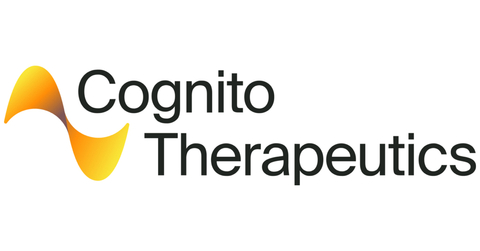Cognito Therapeutics Presents Phase 2 OVERTURE Study Open-Label Extension Data Showing Safety, Adherence and Durability of Treatment Benefits Over 18 Months
Cognito Therapeutics Presents Phase 2 OVERTURE Study Open-Label Extension Data Showing Safety, Adherence and Durability of Treatment Benefits Over 18 Months
- Non-invasive treatment reduces brain atrophy and ADCS-ADL decline over 18 months, consistent with disease modification
- No ARIA observed and safety confirmed over 18 months
- Real-time evidence of target modulation via EEG, and demonstration of biological mechanism of action via MRI imaging
CAMBRIDGE, Mass.--(BUSINESS WIRE)--Cognito Therapeutics, a late-stage developer of disease-modifying therapies to treat neurodegenerative disorders, announced today continued active treatment in the Phase 2 OVERTURE open label extension (OLE) study demonstrated durability and concordance of clinical and MRI benefits over 18 months in patients with Alzheimer’s disease (AD).
Continued treatment and switch to active treatment were both well-tolerated with no treatment limiting SAEs or reported ARIA. Participants receiving sham device treatment who switched to active device treatment demonstrated a similar rate of slowing of disease progression as measured by the Alzheimer's Disease Cooperative Study-Activities of Daily Living (ADCS-ADL) and whole brain volume (WBV) decline compared with patients on continued active treatment but did not reach the early treatment group. The continuous treatment group and the sham-to-active treatment group outcomes did not converge over the 18 month combined study, consistent with disease modification in this patient population.
"We are thrilled to share results from our Phase 2 OVERTURE open-label extension study, which reinforces the safety, high adherence, and long-lasting treatment benefits over 18 months of our Disease Modifying Therapy for mild-to-moderate Alzheimer's disease. Our Phase 2 study demonstrates preservation of cognition and function via approvable endpoints, in conjunction with significant preservation of brain volume, a key biomarker that was concordant with improved patient outcomes," said Brent Vaughan, CEO, Cognito Therapeutics.
The Phase 2 OVERTURE study (NCT03556280) is a randomized controlled trial (RCT) that demonstrated clinical benefits of Cognito’s proprietary gamma sensory stimulation device in mild-to-moderate Alzheimer’s disease. Patients who completed the 6-month RCT were eligible to receive 1-hour daily treatment for an additional 12 months in the OLE. Of the 53 patients who completed the 6-month trial, 44 (83%) patients entered the OLE and 22/44 completed all study assessments.
Safety, tolerability, and high adherence were confirmed in the OLE, with no amyloid-related imaging abnormalities (ARIA) or treatment-limited serious adverse events. The most common adverse events in the RCT study were headache for 21.7% (N=10) of patients on active device versus 10.7% (N=3) on the sham device, and tinnitus for 15.2% (N=7) patients versus none on the sham device. Safety outcomes with the active device remained consistent through the 18-month period. Patients who continued in the OLE portion of the study demonstrated 80% adherence in both the active device group and the group randomized to sham who switched to active device. Clinical stability of function based on total ADCS-ADL was maintained following treatment with active treatment at 18 months.
Active treatment was associated with a longer time to > 15% decline in ADCS-ADL total score vs. sham (mean days 422.27 versus 150.96 respectively). Continued active treatment showed a lower rate of brain atrophy than observed in the sham arm of the study in the RCT and OLE. Sham switch to active treatment suggested a reduced rate of brain atrophy in the OLE compared with the RCT. Early-start and delayed-start model data showed comparable estimated ADCS-ADL and WBV 18-month slopes. Disease modification analysis showed statistically significant separation was maintained during the OLE.
“Cognito’s potential DMT will be instrumental to help mitigate the accelerated brain atrophy caused by anti-amyloid monoclonal antibodies, with no ARIA shown over 18-months in the Phase 2 OLE data,” said Marwan Sabbagh, MD, a neurologist and Chair of the Medical Advisory Board for Cognito Therapeutics. “In addition to providing an attractive alternative to MABs, Cognito’s therapy may also act as a combination therapy to create a continuum of care for AD. This creates a unique value proposition for Cognito to address a broad patient population in AD, with a therapy that has a clean safety profile with no ARIA, convenient administration and no amyloid-beta PET testing required.”
“Cognito therapy represents a novel mechanism of action to treat AD, with a clean safety profile and no incidence of ARIA unlike biologics. Our therapy significantly preserves brain volume over time, with less observation of brain atrophy,” said Ralph Kern, MD, PhD, Chief Medical Officer, Cognito Therapeutics. “With drug-like effects addressing key pathological drives in AD, our compelling Phase 2 OLE data demonstrates potential for use as a monotherapy or as adjunctive therapy in combination.”
Alzheimer’s disease is a multifactorial progressive neurodegenerative disease that disrupts synaptic and neuronal activity and network oscillations and is associated with neuronal loss, brain atrophy, and cognitive and functional decline. It is the seventh leading cause of death among all Americans and the fifth leading cause of death among Americans aged 65 and older.
About Cognito Therapeutics
Cognito Therapeutics is a late-stage developer of disease-modifying therapies to treat neurodegenerative disorders. Its non-invasive neuromodulation platform was developed by MIT Professors and scientific founders Li-Huei Tsai and Ed Boyden. The Company’s lead therapy is currently in a pivotal study (HOPE) in Alzheimer’s Disease and was awarded FDA Breakthrough Device Designation. Cognito is based in Cambridge, MA. For more information, visit www.cognitotx.com. Follow us on Twitter at @cognitotx.
Contacts
Kimberly Ha
KKH Advisors
917-291-5744
kimberly.ha@kkhadvisors.com
